Deck 4: Polynomial Functions
Question
Question
Question
Question
Question
Question
Question
Question
Question
Question
Question
Question
Question
Question
Question
Question
Question
Question
Question
Question
Question
Question
Question
Question
Question
Question
Question
Question
Question
Question
Question
Question
Question
Question
Question
Question
Question
Question
Question
Question
Question
Question
Question
Question
Question
Question
Question
Question
Question
Question
Question
Question
Question
Question
Question
Question
Question
Question
Question
Question
Question
Question
Question
Question
Question
Question
Question
Question
Question
Question
Question
Question
Question
Question
Question
Question

Unlock Deck
Sign up to unlock the cards in this deck!
Unlock Deck
Unlock Deck
1/76
Play
Full screen (f)
Deck 4: Polynomial Functions
1
Determine the vertex of the graph of the quadratic function  .
.
A)
B)
C)
D)
E)
 .
.A)

B)

C)

D)

E)


2
From the graph of the quadratic function  , determine the equation of the axis of symmetry.
, determine the equation of the axis of symmetry.
A)
B)
C)
D)
E)
 , determine the equation of the axis of symmetry.
, determine the equation of the axis of symmetry.A)

B)

C)

D)

E)


3
Write the quadratic function  in standard form.
in standard form.
A)
B)
C)
D)
E)
 in standard form.
in standard form.A)

B)

C)

D)

E)


4
Write the standard form of the equation of the parabola that has a vertex at  and passes through the point
and passes through the point  .
.
A)
B)
C)
D)
E)
 and passes through the point
and passes through the point  .
.A)

B)

C)

D)

E)


Unlock Deck
Unlock for access to all 76 flashcards in this deck.
Unlock Deck
k this deck
5
Write the standard form of the equation of the parabola that has a vertex at  and passes through the point
and passes through the point  .
.
A)
B)
C)
D)
E)
 and passes through the point
and passes through the point  .
.A)

B)

C)

D)

E)


Unlock Deck
Unlock for access to all 76 flashcards in this deck.
Unlock Deck
k this deck
6
Find two positive real numbers whose product is a maximum and whose sum of the first number and four times the second is 280.
A)
B)
C)
D)
E)
A)

B)

C)

D)

E)


Unlock Deck
Unlock for access to all 76 flashcards in this deck.
Unlock Deck
k this deck
7
Compare the graph of  with
with  .
.
A) shifts left 7 units, shifts downward 5 units, and stretches by a factor of 9.
shifts left 7 units, shifts downward 5 units, and stretches by a factor of 9.
B) shifts left 7 units, shifts upward 5 units, and stretches by a factor of 9.
shifts left 7 units, shifts upward 5 units, and stretches by a factor of 9.
C) shifts right 7 units, shifts downward 5 units, and shrinks by a factor of
shifts right 7 units, shifts downward 5 units, and shrinks by a factor of 
)
D) shifts right 7 units, shifts upward 5 units, and shrinks by a factor of
shifts right 7 units, shifts upward 5 units, and shrinks by a factor of 
)
E) shifts right 7 units, shifts upward 5 units, and stretches by a factor of 9.
shifts right 7 units, shifts upward 5 units, and stretches by a factor of 9.
 with
with  .
.A)
 shifts left 7 units, shifts downward 5 units, and stretches by a factor of 9.
shifts left 7 units, shifts downward 5 units, and stretches by a factor of 9.B)
 shifts left 7 units, shifts upward 5 units, and stretches by a factor of 9.
shifts left 7 units, shifts upward 5 units, and stretches by a factor of 9.C)
 shifts right 7 units, shifts downward 5 units, and shrinks by a factor of
shifts right 7 units, shifts downward 5 units, and shrinks by a factor of 
)
D)
 shifts right 7 units, shifts upward 5 units, and shrinks by a factor of
shifts right 7 units, shifts upward 5 units, and shrinks by a factor of 
)
E)
 shifts right 7 units, shifts upward 5 units, and stretches by a factor of 9.
shifts right 7 units, shifts upward 5 units, and stretches by a factor of 9.
Unlock Deck
Unlock for access to all 76 flashcards in this deck.
Unlock Deck
k this deck
8
Describe the right-hand and the left-hand behavior of the graph of  .
.
A) Because the degree is even and the leading coefficient is negative, the graph falls to the left and rises to the right.
B) Because the degree is even and the leading coefficient is negative, the graph rises to the left and falls to the right.
C) Because the degree is even and the leading coefficient is negative, the graph falls to the left and falls to the right.
D) Because the degree is odd and the leading coefficient is negative, the graph rises to the left and rises to the right.
E) Because the degree is even and the leading coefficient is negative, the graph rises to the left and rises to the right.
 .
.A) Because the degree is even and the leading coefficient is negative, the graph falls to the left and rises to the right.
B) Because the degree is even and the leading coefficient is negative, the graph rises to the left and falls to the right.
C) Because the degree is even and the leading coefficient is negative, the graph falls to the left and falls to the right.
D) Because the degree is odd and the leading coefficient is negative, the graph rises to the left and rises to the right.
E) Because the degree is even and the leading coefficient is negative, the graph rises to the left and rises to the right.

Unlock Deck
Unlock for access to all 76 flashcards in this deck.
Unlock Deck
k this deck
9
Find two positive real numbers whose product is a maximum and whose sum is 156.
A)
B)
C)
D)
E)
A)

B)

C)

D)

E)


Unlock Deck
Unlock for access to all 76 flashcards in this deck.
Unlock Deck
k this deck
10
The height,  , of a punted rugby ball is given by
, of a punted rugby ball is given by  where x is the horizontal distance in feet from the point where the ball is punted. How far, horizontally, is the ball from the kicker when it is at its highest point?
where x is the horizontal distance in feet from the point where the ball is punted. How far, horizontally, is the ball from the kicker when it is at its highest point?
A)
B)
C)
D)
E)
 , of a punted rugby ball is given by
, of a punted rugby ball is given by  where x is the horizontal distance in feet from the point where the ball is punted. How far, horizontally, is the ball from the kicker when it is at its highest point?
where x is the horizontal distance in feet from the point where the ball is punted. How far, horizontally, is the ball from the kicker when it is at its highest point?A)

B)

C)

D)

E)


Unlock Deck
Unlock for access to all 76 flashcards in this deck.
Unlock Deck
k this deck
11
From the graph of the quadratic function  , determine the equation of the axis of symmetry.
, determine the equation of the axis of symmetry.
A)
B)
C)
D)
E)
 , determine the equation of the axis of symmetry.
, determine the equation of the axis of symmetry.A)

B)

C)

D)

E)


Unlock Deck
Unlock for access to all 76 flashcards in this deck.
Unlock Deck
k this deck
12
A farmer has 336 feet of fencing and wants to build two identical pens for his prize-winning pigs. The pens will be arranged as shown. Determine the dimensions of a pen that will maximize its area. 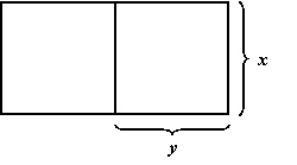
A)
B)
C)
D)
E)

A)

B)

C)

D)

E)


Unlock Deck
Unlock for access to all 76 flashcards in this deck.
Unlock Deck
k this deck
13
Write the quadratic function  in standard form.
in standard form.
A)
B)
C)
D)
E)
 in standard form.
in standard form.A)

B)

C)

D)

E)


Unlock Deck
Unlock for access to all 76 flashcards in this deck.
Unlock Deck
k this deck
14
Match the equation with its graph. 
A)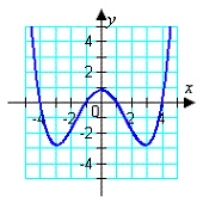
B)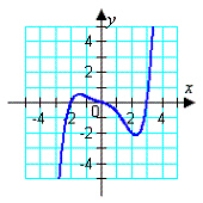
C)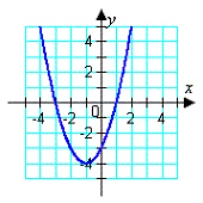
D)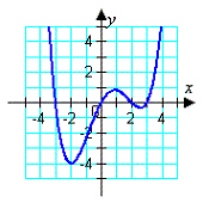
E)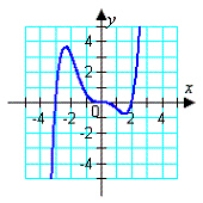

A)

B)

C)

D)

E)


Unlock Deck
Unlock for access to all 76 flashcards in this deck.
Unlock Deck
k this deck
15
Compare the graph of  with
with  .
.
A) - 8 shifts left 4 units, shifts downward 8 units, and shrinks by a factor of
- 8 shifts left 4 units, shifts downward 8 units, and shrinks by a factor of 
)
B) - 8 shifts right 4 units, shifts upward 8 units, and shrinks by a factor of
- 8 shifts right 4 units, shifts upward 8 units, and shrinks by a factor of 
)
C) - 8 shifts left 16 units, shifts upward 8 units, and shrinks by a factor of
- 8 shifts left 16 units, shifts upward 8 units, and shrinks by a factor of 
)
D) - 8 shifts right 16 units, shifts upward 8 units, and shrinks by a factor of
- 8 shifts right 16 units, shifts upward 8 units, and shrinks by a factor of 
)
E) - 8 shifts right 4 units, shifts downward 8 units, and shrinks by a factor of
- 8 shifts right 4 units, shifts downward 8 units, and shrinks by a factor of 
)
 with
with  .
.A)
 - 8 shifts left 4 units, shifts downward 8 units, and shrinks by a factor of
- 8 shifts left 4 units, shifts downward 8 units, and shrinks by a factor of 
)
B)
 - 8 shifts right 4 units, shifts upward 8 units, and shrinks by a factor of
- 8 shifts right 4 units, shifts upward 8 units, and shrinks by a factor of 
)
C)
 - 8 shifts left 16 units, shifts upward 8 units, and shrinks by a factor of
- 8 shifts left 16 units, shifts upward 8 units, and shrinks by a factor of 
)
D)
 - 8 shifts right 16 units, shifts upward 8 units, and shrinks by a factor of
- 8 shifts right 16 units, shifts upward 8 units, and shrinks by a factor of 
)
E)
 - 8 shifts right 4 units, shifts downward 8 units, and shrinks by a factor of
- 8 shifts right 4 units, shifts downward 8 units, and shrinks by a factor of 
)

Unlock Deck
Unlock for access to all 76 flashcards in this deck.
Unlock Deck
k this deck
16
Determine the x-intercept(s) of the quadratic function  .
.
A)
B)
C)
D)
E) no x-intercept(s)
 .
.A)

B)

C)

D)

E) no x-intercept(s)

Unlock Deck
Unlock for access to all 76 flashcards in this deck.
Unlock Deck
k this deck
17
Determine the x-intercept(s) of the quadratic function  .
.
A)
B)
C) no x-intercept(s)
D)
E)
 .
.A)

B)

C) no x-intercept(s)
D)

E)


Unlock Deck
Unlock for access to all 76 flashcards in this deck.
Unlock Deck
k this deck
18
Write the quadratic function  in standard form.
in standard form.
A)
B)
C)
D)
E)
 in standard form.
in standard form.A)

B)

C)

D)

E)


Unlock Deck
Unlock for access to all 76 flashcards in this deck.
Unlock Deck
k this deck
19
A Norman window has the shape of a rectangle surmounted by a semicircle as in the figure below. If the perimeter of the window is  , express the area, A, as a function of the width, x, of the window.
, express the area, A, as a function of the width, x, of the window. 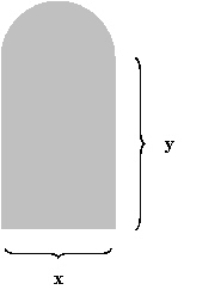
A)
B)
C)
D)
E)
 , express the area, A, as a function of the width, x, of the window.
, express the area, A, as a function of the width, x, of the window. 
A)

B)

C)

D)

E)


Unlock Deck
Unlock for access to all 76 flashcards in this deck.
Unlock Deck
k this deck
20
Find the standard form of the quadratic function shown below: 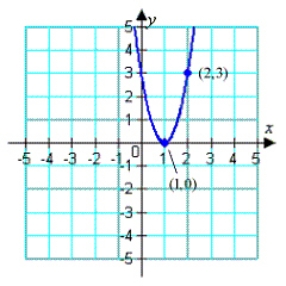
A)
B)
C)
D)
E)

A)

B)

C)

D)

E)


Unlock Deck
Unlock for access to all 76 flashcards in this deck.
Unlock Deck
k this deck
21
Use synthetic division to divide. 
A)
B)
C)
D)
E)

A)

B)

C)

D)

E)


Unlock Deck
Unlock for access to all 76 flashcards in this deck.
Unlock Deck
k this deck
22
Use synthetic division to divide. 
A)
B)
C)
D)
E)

A)

B)

C)

D)

E)


Unlock Deck
Unlock for access to all 76 flashcards in this deck.
Unlock Deck
k this deck
23
Use synthetic division to divide. 
A)
B)
C)
D)
E)

A)

B)

C)

D)

E)


Unlock Deck
Unlock for access to all 76 flashcards in this deck.
Unlock Deck
k this deck
24
Use synthetic division to divide. 


Unlock Deck
Unlock for access to all 76 flashcards in this deck.
Unlock Deck
k this deck
25
Use long division to divide. 
A)
B)
C)
D)
E)

A)

B)

C)

D)

E)


Unlock Deck
Unlock for access to all 76 flashcards in this deck.
Unlock Deck
k this deck
26
Using a graphing utility, graph  and approximate the zeros and their multiplicity.
and approximate the zeros and their multiplicity.
A)
B)
C)
D)
E)
 and approximate the zeros and their multiplicity.
and approximate the zeros and their multiplicity.A)

B)

C)

D)

E)


Unlock Deck
Unlock for access to all 76 flashcards in this deck.
Unlock Deck
k this deck
27
Write  in the form
in the form  when
when  .
.
A)
B)
C)
D)
E)
 in the form
in the form  when
when  .
.A)

B)

C)

D)

E)


Unlock Deck
Unlock for access to all 76 flashcards in this deck.
Unlock Deck
k this deck
28
Find all real zeros of the polynomial  and determine the multiplicity of each.
and determine the multiplicity of each.
A)
B)
C)
D)
E)
 and determine the multiplicity of each.
and determine the multiplicity of each.A)

B)

C)

D)

E)


Unlock Deck
Unlock for access to all 76 flashcards in this deck.
Unlock Deck
k this deck
29
If  , use synthetic division to evaluate
, use synthetic division to evaluate  .
.
A)
B)
C)
D)
E)
 , use synthetic division to evaluate
, use synthetic division to evaluate  .
.A)

B)

C)

D)

E)


Unlock Deck
Unlock for access to all 76 flashcards in this deck.
Unlock Deck
k this deck
30
An open box is to be made from a square piece of cardboard, 32 inches on a side, by cutting equal squares with sides of length x from the corners and turning up the sides (see figure below). If the volume of the box is represented by  , determine the domain of
, determine the domain of  .
. 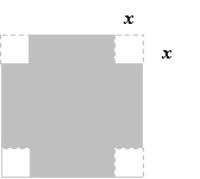
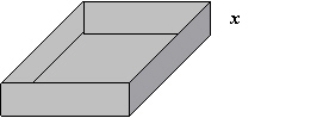
A)
B)
C)
D)
E)
 , determine the domain of
, determine the domain of  .
. 

A)

B)

C)

D)

E)


Unlock Deck
Unlock for access to all 76 flashcards in this deck.
Unlock Deck
k this deck
31
Use synthetic division to divide. 
A)
B)
C)
D)
E)

A)

B)

C)

D)

E)


Unlock Deck
Unlock for access to all 76 flashcards in this deck.
Unlock Deck
k this deck
32
Use long division to divide. 
A)
B)
C)
D)
E)

A)

B)

C)

D)

E)


Unlock Deck
Unlock for access to all 76 flashcards in this deck.
Unlock Deck
k this deck
33
If  is a root of
is a root of  , use synthetic division to factor the polynomial completely and list all real solutions of the equation.
, use synthetic division to factor the polynomial completely and list all real solutions of the equation.
A) ;
; 
B) ;
; 
C) ;
; 
D) ;
; 
E) ;
; 
 is a root of
is a root of  , use synthetic division to factor the polynomial completely and list all real solutions of the equation.
, use synthetic division to factor the polynomial completely and list all real solutions of the equation.A)
 ;
; 
B)
 ;
; 
C)
 ;
; 
D)
 ;
; 
E)
 ;
; 

Unlock Deck
Unlock for access to all 76 flashcards in this deck.
Unlock Deck
k this deck
34
Find all real zeros of the polynomial  and determine the multiplicity of each.
and determine the multiplicity of each.
A)
B)
C)
D)
E)
 and determine the multiplicity of each.
and determine the multiplicity of each.A)

B)

C)

D)

E)


Unlock Deck
Unlock for access to all 76 flashcards in this deck.
Unlock Deck
k this deck
35
Describe the right-hand and the left-hand behavior of the graph of  .
.
A) Because the degree is odd and the leading coefficient is positive, the graph falls to the left and rises to the right.
B) Because the degree is odd and the leading coefficient is positive, the graph rises to the left and rises to the right.
C) Because the degree is odd and the leading coefficient is positive, the graph falls to the left and falls to the right.
D) Because the degree is odd and the leading coefficient is positive, the graph rises to the left and falls to the right.
E) Because the degree is even and the leading coefficient is positive, the graph rises to the left and rises to the right.
 .
.A) Because the degree is odd and the leading coefficient is positive, the graph falls to the left and rises to the right.
B) Because the degree is odd and the leading coefficient is positive, the graph rises to the left and rises to the right.
C) Because the degree is odd and the leading coefficient is positive, the graph falls to the left and falls to the right.
D) Because the degree is odd and the leading coefficient is positive, the graph rises to the left and falls to the right.
E) Because the degree is even and the leading coefficient is positive, the graph rises to the left and rises to the right.

Unlock Deck
Unlock for access to all 76 flashcards in this deck.
Unlock Deck
k this deck
36
Find all real zeros of the polynomial  and determine the multiplicity of each.
and determine the multiplicity of each.
A)
B)
C)
D)
E)
 and determine the multiplicity of each.
and determine the multiplicity of each.A)

B)

C)

D)

E)


Unlock Deck
Unlock for access to all 76 flashcards in this deck.
Unlock Deck
k this deck
37
Describe the right-hand and the left-hand behavior of the graph of  .
.
A) Because the degree is odd and the leading coefficient is negative, the graph rises to the left and falls to the right.
B) Because the degree is odd and the leading coefficient is negative, the graph falls to the left and rises to the right.
C) Because the degree is odd and the leading coefficient is positive, the graph falls to the left and falls to the right.
D) Because the degree is odd and the leading coefficient is positive, the graph rises to the left and rises to the right.
E) Because the degree is even and the leading coefficient is negative, the graph rises to the left and falls to the right.
 .
.A) Because the degree is odd and the leading coefficient is negative, the graph rises to the left and falls to the right.
B) Because the degree is odd and the leading coefficient is negative, the graph falls to the left and rises to the right.
C) Because the degree is odd and the leading coefficient is positive, the graph falls to the left and falls to the right.
D) Because the degree is odd and the leading coefficient is positive, the graph rises to the left and rises to the right.
E) Because the degree is even and the leading coefficient is negative, the graph rises to the left and falls to the right.

Unlock Deck
Unlock for access to all 76 flashcards in this deck.
Unlock Deck
k this deck
38
An open box is to be made from a square piece of cardboard, 21 inches on a side, by cutting equal squares with sides of length x from the corners and turning up the sides (see figure below). Determine the function, V, in terms of x, that represents the volume of the box. 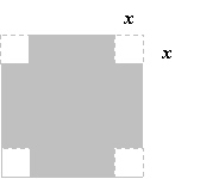
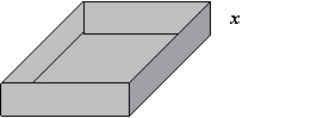
A)
B)
C)
D)
E)


A)

B)

C)

D)

E)


Unlock Deck
Unlock for access to all 76 flashcards in this deck.
Unlock Deck
k this deck
39
Write  in the form
in the form  when
when  , and demonstrate that
, and demonstrate that  .
.
 in the form
in the form  when
when  , and demonstrate that
, and demonstrate that  .
. 
Unlock Deck
Unlock for access to all 76 flashcards in this deck.
Unlock Deck
k this deck
40
Use long division to divide. 
A)
B)
C)
D)
E)

A)

B)

C)

D)

E)


Unlock Deck
Unlock for access to all 76 flashcards in this deck.
Unlock Deck
k this deck
41
Find all zeros of the function  .
.
A)
B)
C)
D)
E)
 .
.A)

B)

C)

D)

E)


Unlock Deck
Unlock for access to all 76 flashcards in this deck.
Unlock Deck
k this deck
42
Using the factors  and
and  , find the remaining factor(s) of
, find the remaining factor(s) of  and write the polynomial in fully factored form.
and write the polynomial in fully factored form.
A)
B)
C)
D)
E)
 and
and  , find the remaining factor(s) of
, find the remaining factor(s) of  and write the polynomial in fully factored form.
and write the polynomial in fully factored form.A)

B)

C)

D)

E)


Unlock Deck
Unlock for access to all 76 flashcards in this deck.
Unlock Deck
k this deck
43
Write  as a product of linear factors.
as a product of linear factors.
A)
B)
C)
D)
E)
 as a product of linear factors.
as a product of linear factors.A)

B)

C)

D)

E)


Unlock Deck
Unlock for access to all 76 flashcards in this deck.
Unlock Deck
k this deck
44
Find all zeros of the function  .
.
A)
B)
C)
D)
E)
 .
.A)

B)

C)

D)

E)


Unlock Deck
Unlock for access to all 76 flashcards in this deck.
Unlock Deck
k this deck
45
Use the zero or root feature of a graphing utility to approximate the zeros of  accurate to the nearest thousandth.
accurate to the nearest thousandth.
A)
B)
C)
D)
E)
 accurate to the nearest thousandth.
accurate to the nearest thousandth.A)

B)

C)

D)

E)


Unlock Deck
Unlock for access to all 76 flashcards in this deck.
Unlock Deck
k this deck
46
If  is a root of
is a root of  , use synthetic division to factor the polynomial completely and list all real solutions of the equation.
, use synthetic division to factor the polynomial completely and list all real solutions of the equation.
A) ;
; 
B) ;
; 
C) ;
; 
D) ;
; 
E) ;
; 
 is a root of
is a root of  , use synthetic division to factor the polynomial completely and list all real solutions of the equation.
, use synthetic division to factor the polynomial completely and list all real solutions of the equation.A)
 ;
; 
B)
 ;
; 
C)
 ;
; 
D)
 ;
; 
E)
 ;
; 

Unlock Deck
Unlock for access to all 76 flashcards in this deck.
Unlock Deck
k this deck
47
Given  is a root, determine all other roots of
is a root, determine all other roots of  .
.
A)
B)
C)
D)
E)
 is a root, determine all other roots of
is a root, determine all other roots of  .
.A)

B)

C)

D)

E)


Unlock Deck
Unlock for access to all 76 flashcards in this deck.
Unlock Deck
k this deck
48
Use the zero or root feature of a graphing utility to approximate the zeros of the function  accurate to the nearest thousandth.
accurate to the nearest thousandth.
A)
B)
C)
D)
E)
 accurate to the nearest thousandth.
accurate to the nearest thousandth.A)

B)

C)

D)

E)


Unlock Deck
Unlock for access to all 76 flashcards in this deck.
Unlock Deck
k this deck
49
Using the factors  and
and  , find the remaining factor(s) of
, find the remaining factor(s) of  and write the polynomial in fully factored form.
and write the polynomial in fully factored form.
A)
B)
C)
D)
E)
 and
and  , find the remaining factor(s) of
, find the remaining factor(s) of  and write the polynomial in fully factored form.
and write the polynomial in fully factored form.A)

B)

C)

D)

E)


Unlock Deck
Unlock for access to all 76 flashcards in this deck.
Unlock Deck
k this deck
50
If  is a root of
is a root of  , use synthetic division to factor the polynomial completely and list all real solutions of the equation.
, use synthetic division to factor the polynomial completely and list all real solutions of the equation.
A)
B)
C)
D)
E)
 is a root of
is a root of  , use synthetic division to factor the polynomial completely and list all real solutions of the equation.
, use synthetic division to factor the polynomial completely and list all real solutions of the equation.A)

B)

C)

D)

E)


Unlock Deck
Unlock for access to all 76 flashcards in this deck.
Unlock Deck
k this deck
51
Find all zeros of the function  .
.
A)
B)
C)
D)
E)
 .
.A)

B)

C)

D)

E)


Unlock Deck
Unlock for access to all 76 flashcards in this deck.
Unlock Deck
k this deck
52
Given  is a root, determine all other roots of
is a root, determine all other roots of  .
.
A)
B)
C)
D)
E)
 is a root, determine all other roots of
is a root, determine all other roots of  .
.A)

B)

C)

D)

E)


Unlock Deck
Unlock for access to all 76 flashcards in this deck.
Unlock Deck
k this deck
53
Find all real solutions of the polynomial equation  .
.
A)
B)
C)
D)
E)
 .
.A)

B)

C)

D)

E)


Unlock Deck
Unlock for access to all 76 flashcards in this deck.
Unlock Deck
k this deck
54
Find all real solutions of the polynomial equation  .
.
A)
B)
C)
D)
E)
 .
.A)

B)

C)

D)

E)


Unlock Deck
Unlock for access to all 76 flashcards in this deck.
Unlock Deck
k this deck
55
Find all the rational zeros of the function  .
.
A)
B)
C)
D)
E)
 .
.A)

B)

C)

D)

E)


Unlock Deck
Unlock for access to all 76 flashcards in this deck.
Unlock Deck
k this deck
56
Write  as a product of linear factors.
as a product of linear factors.
A)
B)
C)
D)
E)
 as a product of linear factors.
as a product of linear factors.A)

B)

C)

D)

E)


Unlock Deck
Unlock for access to all 76 flashcards in this deck.
Unlock Deck
k this deck
57
Given  is a root, determine all other roots of
is a root, determine all other roots of  .
.
A)
B)
C)
D)
E)
 is a root, determine all other roots of
is a root, determine all other roots of  .
.A)

B)

C)

D)

E)


Unlock Deck
Unlock for access to all 76 flashcards in this deck.
Unlock Deck
k this deck
58
Simplify the rational expression,  , by using long division or synthetic division.
, by using long division or synthetic division.
A)
B)
C)
D)
E)
 , by using long division or synthetic division.
, by using long division or synthetic division.A)

B)

C)

D)

E)


Unlock Deck
Unlock for access to all 76 flashcards in this deck.
Unlock Deck
k this deck
59
Simplify the rational expression,  , by using long division or synthetic division.
, by using long division or synthetic division.
A)
B)
C)
D)
E)
 , by using long division or synthetic division.
, by using long division or synthetic division.A)

B)

C)

D)

E)


Unlock Deck
Unlock for access to all 76 flashcards in this deck.
Unlock Deck
k this deck
60
Find all the rational zeros of the function  .
.
A)
B)
C)
D)
E)
 .
.A)

B)

C)

D)

E)


Unlock Deck
Unlock for access to all 76 flashcards in this deck.
Unlock Deck
k this deck
61
After determining whether the variation model below is of the form  or
or  , find the value of k.
, find the value of k.
A)

B)
C)
D)
E)
 or
or  , find the value of k.
, find the value of k.A)


B)

C)

D)

E)


Unlock Deck
Unlock for access to all 76 flashcards in this deck.
Unlock Deck
k this deck
62
Determine whether the variation model below is of the form  or
or  .
.
A)

B)
 or
or  .
.A)


B)


Unlock Deck
Unlock for access to all 76 flashcards in this deck.
Unlock Deck
k this deck
63
After determining whether the variation model below is of the form  or
or  , find the value of k.
, find the value of k.
A)

B)
C)
D)
E)
 or
or  , find the value of k.
, find the value of k.A)


B)

C)

D)

E)


Unlock Deck
Unlock for access to all 76 flashcards in this deck.
Unlock Deck
k this deck
64
Find a mathematical model for the verbal statement: "z varies directly as the square of x and inversely as p."
A)
B)
C)
D)
E)
A)

B)

C)

D)

E)


Unlock Deck
Unlock for access to all 76 flashcards in this deck.
Unlock Deck
k this deck
65
Use Descartes' Rule of Signs to determine the possible number of positive and negative zeros of  .
.
A) 3 positive reals or 1 positive real; 3 negative reals or 1 negative real
B) no positive reals; no negative reals
C) 3 positive reals or 1 positive real; 1 negative real
D) 1 positive real; 3 negative reals or 1 negative real
E) 3 positive reals or 1 positive real; no negative reals
 .
.A) 3 positive reals or 1 positive real; 3 negative reals or 1 negative real
B) no positive reals; no negative reals
C) 3 positive reals or 1 positive real; 1 negative real
D) 1 positive real; 3 negative reals or 1 negative real
E) 3 positive reals or 1 positive real; no negative reals

Unlock Deck
Unlock for access to all 76 flashcards in this deck.
Unlock Deck
k this deck
66
Find all the real zeros of  .
.
A)
B)
C)
D)
E)
 .
.A)

B)

C)

D)

E)


Unlock Deck
Unlock for access to all 76 flashcards in this deck.
Unlock Deck
k this deck
67
Assume that y is directly proportional to x. If  and
and  , determine a linear model that relates y and x.
, determine a linear model that relates y and x.
A)
B)
C)
D)
E)
 and
and  , determine a linear model that relates y and x.
, determine a linear model that relates y and x.A)

B)

C)

D)

E)


Unlock Deck
Unlock for access to all 76 flashcards in this deck.
Unlock Deck
k this deck
68
Find a mathematical model for the verbal statement: 


A)
B)
C)
D)
E)



A)

B)

C)

D)

E)


Unlock Deck
Unlock for access to all 76 flashcards in this deck.
Unlock Deck
k this deck
69
Use Descartes' Rule of Signs to determine the possible number of positive and negative zeros of  .
.
A) 1 positive real; 3 negative reals or 1 negative real
B) no positive reals; no negative reals
C) 1 positive real; 5 negative reals or 3 negative reals or 1 negative real
D) 5 positive reals or 3 positive reals or 1 positive real; no negative reals
E) 3 positive reals or 1 positive real; 3 negative reals or 1 negative real
 .
.A) 1 positive real; 3 negative reals or 1 negative real
B) no positive reals; no negative reals
C) 1 positive real; 5 negative reals or 3 negative reals or 1 negative real
D) 5 positive reals or 3 positive reals or 1 positive real; no negative reals
E) 3 positive reals or 1 positive real; 3 negative reals or 1 negative real

Unlock Deck
Unlock for access to all 76 flashcards in this deck.
Unlock Deck
k this deck
70
Hooke's law states that the magnitude of force, F, required to stretch a spring x units beyond its natural length is directly proportional to x. If a force of 2 pounds stretches a spring from its natural length of 10 inches to a length of 10.7 inches, what force will stretch the spring to a length of 11.5 inches? Round answer to nearest hundredth.
A)
B)
C)
D)
E)
A)

B)

C)

D)

E)


Unlock Deck
Unlock for access to all 76 flashcards in this deck.
Unlock Deck
k this deck
71
Find all the real zeros of  .
.
A)
B)
C)
D)
E)
 .
.A)

B)

C)

D)

E)


Unlock Deck
Unlock for access to all 76 flashcards in this deck.
Unlock Deck
k this deck
72
The sales tax on an item with a retail price of $972 is $77.76. Create a variational model that gives the retail price, y, in terms of the sales tax, x, and use it to determine the retail price of an item that has a sales tax of $92.34.
A) $1156.24
B) $1125.88
C) $1154.25
D) $1166.48
E) $1098.56
A) $1156.24
B) $1125.88
C) $1154.25
D) $1166.48
E) $1098.56

Unlock Deck
Unlock for access to all 76 flashcards in this deck.
Unlock Deck
k this deck
73
The electrical resistance, R, of a wire is directly proportional to its length, l, and inversely proportional to the square of its diameter, d. A wire 100 meters long of diameter 5 millimeters has a resistance of 8 ohms. Find the resistance of a wire made of the same material that has a diameter of 4 millimeters and is 64 meters long.
A)
B)
C)
D)
E)
A)

B)

C)

D)

E)


Unlock Deck
Unlock for access to all 76 flashcards in this deck.
Unlock Deck
k this deck
74
Use Descartes' Rule of Signs to determine the possible number of positive and negative zeros of  .
.
A) no positive reals; no negative reals
B) 1 positive real; 3 negative reals or 1 negative real
C) 0 positive real; 3 negative reals or 1 negative real
D) 3 positive reals or 1 positive real; no negative reals
E) 3 positive reals or 1 positive real; 3 negative reals or 1 negative real
 .
.A) no positive reals; no negative reals
B) 1 positive real; 3 negative reals or 1 negative real
C) 0 positive real; 3 negative reals or 1 negative real
D) 3 positive reals or 1 positive real; no negative reals
E) 3 positive reals or 1 positive real; 3 negative reals or 1 negative real

Unlock Deck
Unlock for access to all 76 flashcards in this deck.
Unlock Deck
k this deck
75
Determine whether the variation model below is of the form  or
or  .
.
A)

B)
 or
or  .
.A)


B)


Unlock Deck
Unlock for access to all 76 flashcards in this deck.
Unlock Deck
k this deck
76
The simple interest on an investment is directly proportional to the amount of the investment. By investing $7750 in a certain certificate of deposit, you obtained an interest payment of $372.00 after 1 year. Determine a mathematical model that gives the interest, I , for this CD after 1 year in terms of the amount invested, P.
A)
B)
C)
D)
E)
A)

B)

C)

D)

E)


Unlock Deck
Unlock for access to all 76 flashcards in this deck.
Unlock Deck
k this deck



